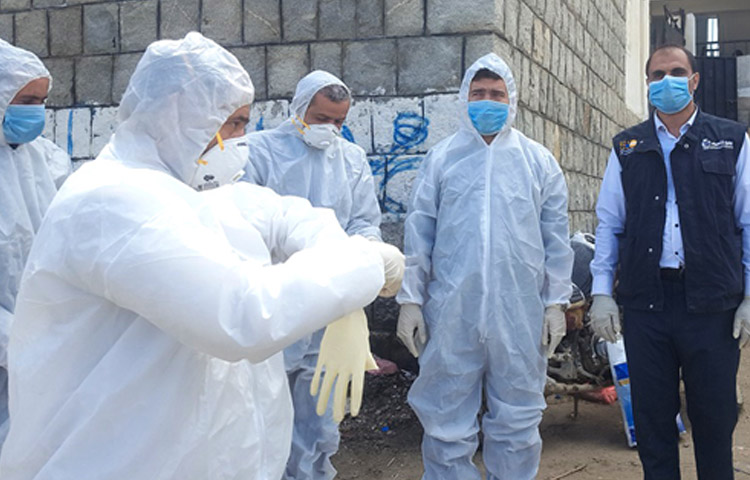
The Yemen COVID-19 Response Project is being implemented in the Republic of Yemen by WHO with the support and finance of World Bank since 4th of April 2020. The project aims to prevent, detect and respond to the threat posed by COVID-19 and strengthen national systems for public health preparedness.
Within this context, Additional Financing is a new grant by the World Bank approved in June 2021 to support the costs of expanding activities under the Yemen COVID-19 Response Project. In addition, it will support access to COVID-19 vaccines and help ensure effective vaccine deployment in the country through vaccination system strengthening.
The environmental and social documents of the Yemen COVID-19 Response Project have been updated to include the new activities supported by the Additional Financing to comply with the project requirements.
Environmental and social commitment plan
The environmental and social commitment plan sets out material measures and actions that need to be carried out throughout the entire project cycle to comply with the World Bank's environmental and social standards.
Environmental and social commitment plan
Environmental and social management framework
The environmental and social management framework assists implementation of the Project inside Yemen through the development of necessary plans in accordance with the World Bank’s environmental and social management framework and proposes a clear delineation of responsibilities in compliance with the project's Environmental and Social Commitment Plan.
In addition to describing the rules, regulations and guidelines applicable for the project, the framework outlines the procedures to identify and mitigate the environmental and social risks and impacts associated with the project's activities during the various implementation stages. Monitoring requirements and the principles of infection control and medical waste management, as well as a stakeholders engagement and grievances mechanism, are also included in the framework.
Environmental and social management framework
Environmental and social management plan
For subprojects that involve civil work activities and implemented under the Yemen COVID-19 Response Project, the environmental and social management plan will be prepared for each subproject to ensure the associated environmental and social risks are properly identified and managed. Environmental and social management plan consists of the set of mitigation, monitoring and institutional measures to be taken during implementation and operation of an activity to eliminate adverse environmental and social risks and impacts, offsets them, or reduce them to acceptable levels.
Isolation units rehabilitation
Infection control and medical waste management plan
The infection control and medical waste management plan overall objective is to prevent and/or mitigate the negative impacts of infection and medical waste on human health and the environment. The plan includes advocacy for good practices in infection control and medical waste management and is to be used by health, sanitary and cleaning workers who manage medical waste in project-supported health care facilities. The plan also includes good practices and procedures for waste packaging and storage, segregation, transportation, treatment and disposal.
Infection control and medical waste management plan
Labor management procedures
The labor management procedures have been prepared in line with the requirements of the World Bank’s Environmental and Social Standard ESS2, Labor and Working Conditions. The procedures detail the types of project worker as well as the applicable labor rules and regulations.
The Project will involve the use of: 1) direct workers, who will be engaged directly by WHO and staff from local health authorities at governorate level; and 2) contracted workers (medical and non-medical) who will be hired to respond to a surge in demand for services due to the COVID-19 pandemic in selected hospitals and to support implementation, including training, capacity-building and communications.
The procedures outline the key labor risks, mitigation measures and occupational health and safety requirements, as well as key administrative controls, applicable for the Yemen COVID-19 Response Project that need to be applied so that the workers will be protected from any adverse impacts resulting from activities implementation.
Stakeholder engagement plan
As per the Word Bank's Environmental and Social Standard ESS10, Stakeholders Engagement and Information Disclosure, the implementing agencies should provide stakeholders with timely, relevant, understandable and accessible information, and consult with them in a culturally appropriate manner, which is free of manipulation, interference, coercion, discrimination and intimidation.
The overall objective of the stakeholder engagement plan is to define a roadmap for stakeholder engagement, including public information disclosure and consultation of safeguard instruments, throughout the entire project cycle. The plan outlines the ways in which the project team will communicate with stakeholders and includes a mechanism by which people can raise concerns, provide feedback, or make complaints about project and any activities related to the project.


